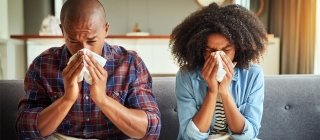Survival Tips for Seasonal Allergies

Spring can be a great time of year unless you're one of the millions who suffer from seasonal allergies. Don't let allergies ruin your spring; read our 10 tips to combat seasonal allergies.
The lush, green landscape that makes Vermont so beautiful also has some drawbacks. Trees, grasses, and other plants are emitting pollen, which can cause seasonal allergies. Even if you don’t usually suffer from allergies, such as sensitivity to pets and certain foods, sometimes pollen levels are so high that you can be affected.
What Are Seasonal Allergy Symptoms?
Warmer temperatures due to climate change and increased carbon dioxide levels in the atmosphere may be encouraging plants to produce more pollen. As pollen counts go higher and plants are pollenating longer, it’s fueling a growth in seasonal allergies.
You may have seasonal allergies if you are experiencing:
- Itchy, watery or red eyes
- Runny or stuffed up nose
- Post-nasal drip and/or sore throat
- Sneezing
- Coughing or difficulty breathing
In Vermont, spring is the most likely time to have seasonal allergies, as that’s when most plants bloom. However, you may start feeling it in late February or March when maples and other trees begin to pollinate. Seasonal allergies may subside during summer, but then come back in mid-August when ragweed pollinates. It may last through the fall until a hard frost kills the ragweed and other plants go dormant for winter.
How to Combat Seasonal Allergies
Seasonal allergies can be frustrating because the cause is in the air that we all need to breathe. While they may be inescapable, there are several things you can do to reduce the impact of seasonal allergies:
- Know what the pollen count is. Many weather sites provide local pollen counts and a forecast of what pollen levels will be for the next several days. Get in the habit of checking this often, as it will help you decide if you need to alter your outdoor plans.
- Keep windows and doors closed when pollen counts are up.
- Stay inside when pollen levels are high. Pollen levels start low in the morning and rise at midday and in the afternoon, so plan your outdoor activity accordingly. Likewise, pollen will be lower after rain washes it out of the air and higher on windy days.
- Use your vehicle’s air conditioning system, especially if it has an air filter. Select the setting to recirculate air, rather than bringing fresh air in.
- Keep things clean by hosing down outdoor furniture, decks, and walkways to keep pollen from being brought inside.
- Wash your hands after being outside. Taking a shower can also help wash pollen away.
- Change your clothes after working or recreating outside to keep pollen from being spread around your living space.
- Take allergy medicine beforehand. There are many good antihistamines now available without a prescription. Keep some on hand and take it according to package instructions when you know pollen counts will be high to prevent symptoms. It can take a day or two for the medication to start working, so plan ahead. If a medication doesn’t work well enough for you, try a different one to see if it works better. Some people can’t take antihistamines, for example, those with high blood pressure, so you may want to check with your doctor first to see if they are safe for you to use.
- Wear a mask if you need to mow the lawn. Mowing can kick up lots of grass pollen, so a good fitting dust mask can help reduce exposure. If your eyes react to pollen, consider wearing goggles. Mow when it is less windy to keep chute discharge from being blown at you.
- Keep pets away from heavy pollen areas. If you have pets, try to keep them out of flowers and weedy areas when pollen counts are up, so they don’t bring pollen inside on their fur.
- If you have asthma, talk with your doctor. Pollen can trigger asthma symptoms, so if you have asthma you may want to talk with your doctor about medication adjustments during certain times of the year.
Hopefully, if you only occasionally have seasonal allergy symptoms, taking these steps will provide some relief. If you experience symptoms more often, or your reaction is more severe, you should consider seeing an allergist (a doctor who specializes in allergies) to be tested.
Allergy testing can determine which substances you are allergic to and how sensitive you are to those things. With that information, you will be able to take more specific steps to avoid exposure. You can also talk with the allergist about potential treatments and whether they are right for you.
If you need an allergist, you can use our Find a Doctor tool.



